Iran Foreign Minister Expects Nuclear Deal to be Scrapped : A Well Thought Out Scream by James Riordan
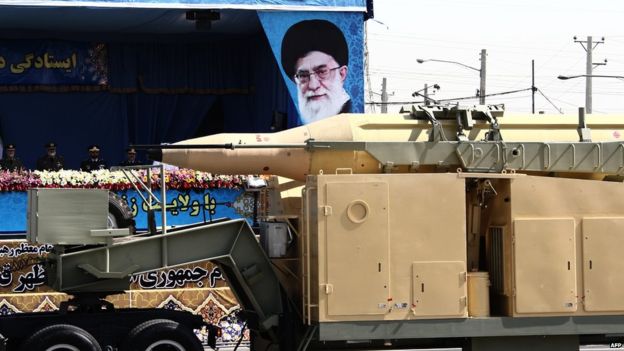
Mohammad Javad Zarif, Iran’s foreign minister, has said he believes the United States will abandon the international agreement that restricts his country’s nuclear program. He also said that he hoped Europe would keep the agreement in place. United States President Donald Trump, who has been a strong critic of the pact, is scheduled to announce next month whether he believes Iran has adhered to the terms of the agreement.
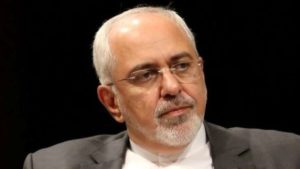 In July 2015, there were two uranium enrichment facilities in Iran – Natanz and Fordo – where uranium hexafluoride gas was being fed into centrifuges to separate out the most fissile isotope U-235. Low-enriched uranium, which has a 3%-4% concentration of U-235, can be used to produce fuel for nuclear power plants. But it can also be enriched to the 90% needed to produce nuclear weapons. At that time Iran had almost 20,000 centrifuges. Part of the nuclear agreement they signed, the Joint Comprehensive Plan of Action (JCPOA), limited them to installing no more than 5,060 of the oldest and least efficient centrifuges at Natanz for 10 years. Iran’s uranium stockpile was also be reduced by 98% to 300kg (660lbs) for the next 15 years. It was also to keep its level of enrichment at 3.67%. The JCPOA says Iran would not be permitted to build additional heavy-water reactors or accumulate any excess heavy water for 15 years. By January 2016, Iran had drastically reduced the number of centrifuges installed at Natanz and Fordo, and shipped tonnes of low-enriched uranium to Russia.
In July 2015, there were two uranium enrichment facilities in Iran – Natanz and Fordo – where uranium hexafluoride gas was being fed into centrifuges to separate out the most fissile isotope U-235. Low-enriched uranium, which has a 3%-4% concentration of U-235, can be used to produce fuel for nuclear power plants. But it can also be enriched to the 90% needed to produce nuclear weapons. At that time Iran had almost 20,000 centrifuges. Part of the nuclear agreement they signed, the Joint Comprehensive Plan of Action (JCPOA), limited them to installing no more than 5,060 of the oldest and least efficient centrifuges at Natanz for 10 years. Iran’s uranium stockpile was also be reduced by 98% to 300kg (660lbs) for the next 15 years. It was also to keep its level of enrichment at 3.67%. The JCPOA says Iran would not be permitted to build additional heavy-water reactors or accumulate any excess heavy water for 15 years. By January 2016, Iran had drastically reduced the number of centrifuges installed at Natanz and Fordo, and shipped tonnes of low-enriched uranium to Russia.
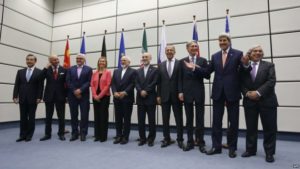 In addition, the agreement required that research and development would only take place only at Natanz and be limited for eight years. No enrichment will be permitted at Fordo for 15 years, and the underground facility will be converted into a nuclear, physics and technology centre. The 1,044 centrifuges at the site will produce radioisotopes for use in medicine, agriculture, industry and science. Iran had been building a heavy-water nuclear facility near the town of Arak. Spent fuel from a heavy-water reactor contains plutonium suitable for a nuclear bomb. Originally, world powers had wanted Arak dismantled because of the proliferation risk. Under an interim nuclear deal agreed in November 2013, Iran agreed not to commission or fuel the reactor. Iran has also agreed to redesign the reactor so it cannot produce any weapons-grade plutonium. All spent fuel will be sent out of the country as long as the modified reactor exists. Most of the 20 tonnes of heavy water the Arak facility is expected to produce will be shipped to the US via a third country, according to Iranian officials. About 6 tonnes will be retained to make medical isotopes. When the agreement was signed the Obama White House said the deal would prevent Iran obtaining a nuclear weapon. Iran maintained that it had the right to nuclear energy – and stressed that its nuclear program was for peaceful purposes only.
In addition, the agreement required that research and development would only take place only at Natanz and be limited for eight years. No enrichment will be permitted at Fordo for 15 years, and the underground facility will be converted into a nuclear, physics and technology centre. The 1,044 centrifuges at the site will produce radioisotopes for use in medicine, agriculture, industry and science. Iran had been building a heavy-water nuclear facility near the town of Arak. Spent fuel from a heavy-water reactor contains plutonium suitable for a nuclear bomb. Originally, world powers had wanted Arak dismantled because of the proliferation risk. Under an interim nuclear deal agreed in November 2013, Iran agreed not to commission or fuel the reactor. Iran has also agreed to redesign the reactor so it cannot produce any weapons-grade plutonium. All spent fuel will be sent out of the country as long as the modified reactor exists. Most of the 20 tonnes of heavy water the Arak facility is expected to produce will be shipped to the US via a third country, according to Iranian officials. About 6 tonnes will be retained to make medical isotopes. When the agreement was signed the Obama White House said the deal would prevent Iran obtaining a nuclear weapon. Iran maintained that it had the right to nuclear energy – and stressed that its nuclear program was for peaceful purposes only.
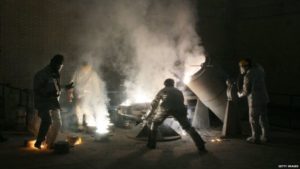 If President Trump says that Iran has failed to keep its end of then agreement, US Congress will begin the process of reimposing sanctions on Iran. Earlier this month, Mr Trump said the agreement was an “embarrassment” in a speech to the United Nations. France, Germany and the UK – which along with Russia and China signed the deal – have recently defended it. In an interview with two British newspapers, Mr Zarif said that if the deal collapsed, Iran would no longer have to follow its limitations on uranium enrichment, centrifuge numbers and the production of plutonium. But he insisted Iran would only use nuclear technology for peaceful purposes.”You either live by it [the deal] or you set it aside,” Mr Zarif told the Financial Times and the Guardian. “You cannot be half pregnant.””My assumption and guess is that he [Trump] will not certify and then will allow Congress to take the decision,” Mr Zarif said during the interview at the Iranian UN mission’s residence in New York. “The deal allowed Iran to continue its research and development. So we have improved our technological base. If we decide to walk away from the deal we would be walking away with better technology.”
If President Trump says that Iran has failed to keep its end of then agreement, US Congress will begin the process of reimposing sanctions on Iran. Earlier this month, Mr Trump said the agreement was an “embarrassment” in a speech to the United Nations. France, Germany and the UK – which along with Russia and China signed the deal – have recently defended it. In an interview with two British newspapers, Mr Zarif said that if the deal collapsed, Iran would no longer have to follow its limitations on uranium enrichment, centrifuge numbers and the production of plutonium. But he insisted Iran would only use nuclear technology for peaceful purposes.”You either live by it [the deal] or you set it aside,” Mr Zarif told the Financial Times and the Guardian. “You cannot be half pregnant.””My assumption and guess is that he [Trump] will not certify and then will allow Congress to take the decision,” Mr Zarif said during the interview at the Iranian UN mission’s residence in New York. “The deal allowed Iran to continue its research and development. So we have improved our technological base. If we decide to walk away from the deal we would be walking away with better technology.”
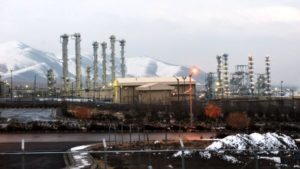
 He said of Mr Trump: “I think he has made a policy of being unpredictable, and now he’s turning that into being unreliable as well. He has violated the letter, spirit, everything of the deal.” Mr Zarif said Iran’s options “will depend on how the rest of the international community deal with the United States”.”If Europe and Japan and Russia and China decided to go along with the US, then I think that will be the end of the deal,” he said. “Europe should lead.”European Union officials have said they could act to legally protect European investors in Iran if the US reimposes sanctions. But, in line with the US, they have also criticised Iran over its non-nuclear activities in the region.n Iran if the US reimposes sanctions.
He said of Mr Trump: “I think he has made a policy of being unpredictable, and now he’s turning that into being unreliable as well. He has violated the letter, spirit, everything of the deal.” Mr Zarif said Iran’s options “will depend on how the rest of the international community deal with the United States”.”If Europe and Japan and Russia and China decided to go along with the US, then I think that will be the end of the deal,” he said. “Europe should lead.”European Union officials have said they could act to legally protect European investors in Iran if the US reimposes sanctions. But, in line with the US, they have also criticised Iran over its non-nuclear activities in the region.n Iran if the US reimposes sanctions.
The sanctions originally imposed by the UN, US and EU crippled Iran’s economy, costing the country more than $160bn (£110bn) in oil revenue since 2012 alone. By agreeing to the plan Iran gained access to more than $100bn in assets frozen overseas, and was able to resume selling oil on international markets and using the global financial system for trade. Should Iran be deemed to have violated any aspect 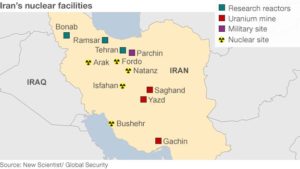 of the deal, the UN sanctions will automatically “snap back” into place for 10 years, with the possibility of a five-year extension. If the Joint Commission cannot resolve a dispute, it will be referred to the UN Security Council. Iran also agreed to the continuation of the UN arms embargo on the country for up to five years, although it could end earlier if the IAEA is satisfied that its nuclear programme is entirely peaceful. A UN ban on the import of ballistic missile technology will also remain in place for up to eight years.
of the deal, the UN sanctions will automatically “snap back” into place for 10 years, with the possibility of a five-year extension. If the Joint Commission cannot resolve a dispute, it will be referred to the UN Security Council. Iran also agreed to the continuation of the UN arms embargo on the country for up to five years, although it could end earlier if the IAEA is satisfied that its nuclear programme is entirely peaceful. A UN ban on the import of ballistic missile technology will also remain in place for up to eight years.


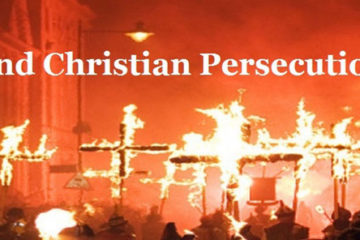
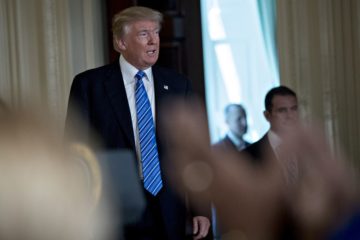
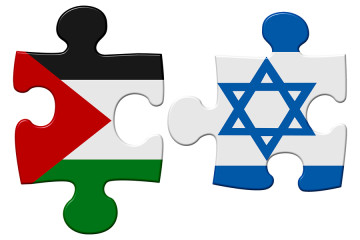


No Comment